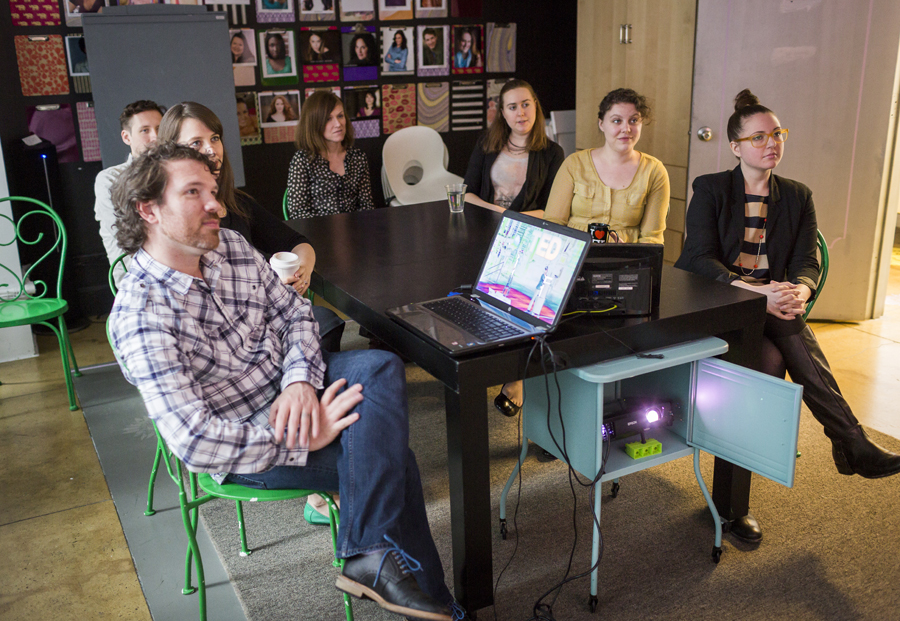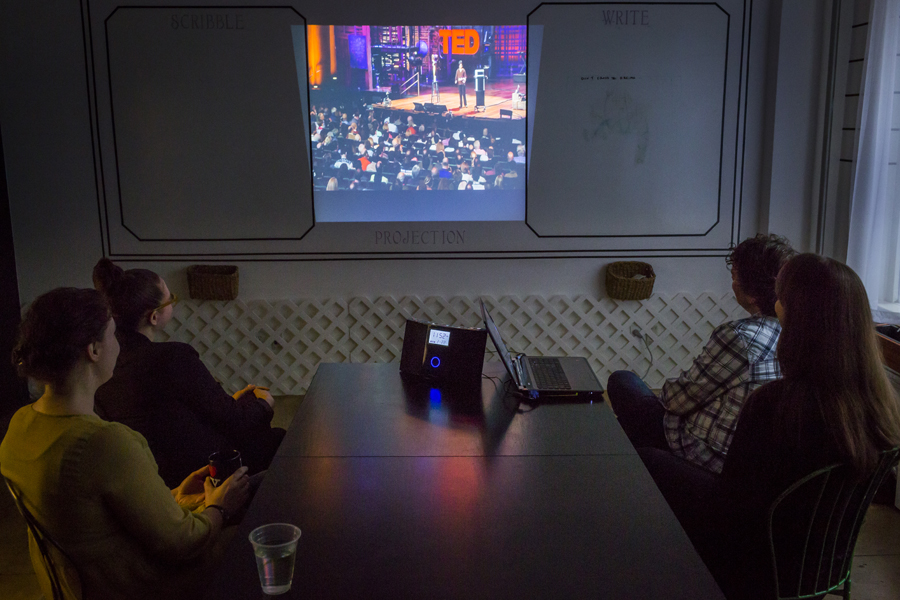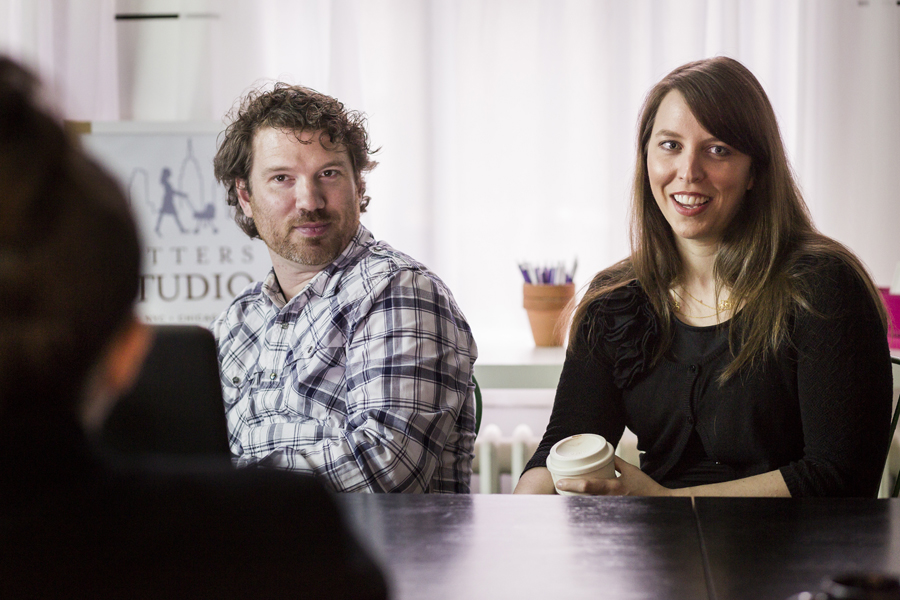
It’s TED Talk Tuesday time at Sitters Studio in midtown Manhattan. This weekly tradition is a vital part of the office culture. Photo: Ryan Lash
It’s 1pm at Sitters Studio, and seven people are gathered around a table while Adora Svitak’s “What adults can learn from kids” plays on a whiteboard in front of them.
 Adora Svitak: What adults can learn from kids
On video, the then-12-year-old begins, “When was the last time you were called childish?” Nods around the table. “For kids like me, it happens every time we make irrational demands, exhibit irresponsible behavior or display any other signs of being normal American citizens.” The group cracks up — this is a babysitting company, after all.
Adora Svitak: What adults can learn from kids
On video, the then-12-year-old begins, “When was the last time you were called childish?” Nods around the table. “For kids like me, it happens every time we make irrational demands, exhibit irresponsible behavior or display any other signs of being normal American citizens.” The group cracks up — this is a babysitting company, after all.
Welcome to TED Talk Tuesday, a tradition at this small business in midtown Manhattan that sets families up with artist babysitters. (The idea behind Sitters Studio: Kids get a dose of creativity from their sitters, while artists get reliable work as they build their careers.) Sitters Studio founder Kristina Wilson began TED Talk Tuesday years ago as a way to build a thoughtful, curious office culture. Every week, a different employee picks a talk for the group to watch. And, says Wilson, many talks have had an effect on how the studio does business.
Robby Sandler, who does customer relations for the studio, says TED Talk Tuesday is such an institution in the office that he heard about it on his first interview. “We just sit around and have a conversation about a talk, and see where it goes organically. Sometimes it will lead to people sharing stories about their own lives, sometimes it’s something which translates into the business,” he says. “It’s just exciting to be reminded that the people in our office are intelligent people who respond in very unique ways to the same interesting idea.”
For last week’s TED Talk Tuesday, Wilson chose Svitak’s talk, in hopes that it would resonate. But the room was chilly toward it.
“Her perspective is: listen to kids,” says one viewer. “Giving that message to sitters is not necessarily what parents want.”
“But her idea that if you lower expectations, kids will drop down to it—that’s valid,” says another.
“Kids do need to start learning what life is when they’re young and can bounce back,” says a third staffer. “It’s better to learn life lessons now than when they’re 30.”
The first employee pipes up again. “But this global idea of letting kids be in charge—it’s tough for us to advise that perspective. It’s really up to the parents. “
“Well, we encourage kids to use their voice in art projects,” someone else points out.
That idea excites Jaimie Van Dyke, Sitters Studio’s office manager. “Having an art sitter may be the only time that these kids get to have no expectations. They go to prestigious schools and do a lot of structured activities. This is a time where they don’t have so many rules.”

Last week, the group watched a talk from Adora Svitak, who was 12 when she spoke on the TED stage. Photo: Ryan Lash
Some talks screened during TED Talk Tuesday have actually led to changes in Sitters Studio’s policies. Before watching Barry Schwartz’s “The paradox of choice,” for example
 Barry Schwartz: The paradox of choice
Sitters Studio would send parents the profiles of several sitters and ask them to choose one. After watching his talk, however, they started offering just one option.
Barry Schwartz: The paradox of choice
Sitters Studio would send parents the profiles of several sitters and ask them to choose one. After watching his talk, however, they started offering just one option.
“By sending a family five profiles of sitters who could cover the appointment, they’ll always wonder what might’ve been, and not necessarily have as great an experience as if we just said, ‘This sitter fits you perfectly,’” Sandler says. “I think that people’s response to our company has gotten better and better since we’ve been able to start implementing that successfully.”
Amy Cuddy’s “Your body language shapes who you are” also resonated with the group
 Amy Cuddy: Your body language may shape who you are
—so much so that they decided to show the talk at a quarterly meeting with all the agency’s sitters to underline the importance of body language. This larger group also watched Drew Dudley’s “Everyday leadership” — the part where he describes handing out lollipops at his student union in college, and four years later, hearing from another student who told him that getting a lollipop that day helped her overcome her fear of starting college.
Amy Cuddy: Your body language may shape who you are
—so much so that they decided to show the talk at a quarterly meeting with all the agency’s sitters to underline the importance of body language. This larger group also watched Drew Dudley’s “Everyday leadership” — the part where he describes handing out lollipops at his student union in college, and four years later, hearing from another student who told him that getting a lollipop that day helped her overcome her fear of starting college.
“It was a chance to talk about the impact that we all have on people that we don’t realize,” says Sandler, “and things that we can do to help maximize the possibility of lollipop moments.”
Wilson hopes her staffers will take lessons from TED Talks with them into their work and beyond. “I know that not everyone will work here forever,” she says. “In my head, I think it is also the job of a good boss to make sure that people’s lives are bettered during the time that they’re with you. This is one thing we do to accomplish that.”

Director of Operations Jason Jeunnette and founder Kristina Wilson share their thoughts on the talk, coffee in hand. Photo: Ryan Lash
Comments (4)